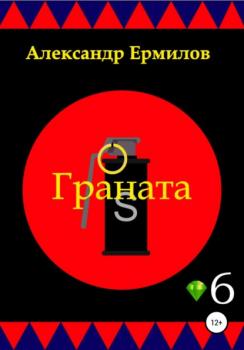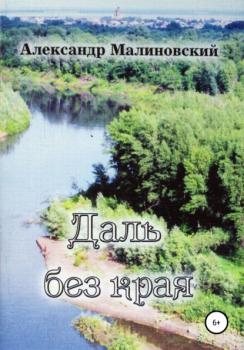ТОП просматриваемых книг сайта:
Автор
Все книги издательства АвторАннотация
Теперь она будет делать все, что ей скажут. У нее нет другого выбора – она на крючке. Ее жизнь надежно зажата в тисках шантажиста. И он не отступит, не сдаст позиции, он будет давить до победного, пока окончательно не сломает волю…
Аннотация
Это реальная история, которая приключилась со мной и которая сильно изменила моё отношение к жизни. И да, я действительно попытался выйти в окно. Меня словно провели по лезвию бритвы. По долгу службы я хорошо знаком с теорией вероятностей, неоднократно применял её на практике. Поэтому могу оценить вероятность тех или иных событий, последовательности событий. И меня не покидает ощущение, что всё, что со мной произошло за эти несколько дней, было не случайно. Словно кто-то разыграл меня. Причём сделал это остроумно, с хорошим чувством юмора. Зачем я это публикую? Я это обещал сделать. Пусть в бреду, пусть сам себе, но обещал.
Аннотация
Взвод солдат пытается противостоять инопланетным врагам. Удастся ли им отразить нападение? Что делать, если враг превосходит количеством? После длительного боя в руке остается только одна граната…
Аннотация
Если и можно решить сразу все проблемы общества, то это вряд ли удастся простому смертному. Но кто сказал, что это совсем невозможно? Человек порой не может справиться со всеми задачами сразу, но зато может создать изобретение, которое сделает это за него. И имя изобретению – робототехника. Чем закончится история одного золотого сердца с желанием и возможность помочь всем?
Публикуется в авторской редакции с сохранением авторских орфографии и пунктуации.
Аннотация
Мне исполнилось восемнадцать. Я давно покинул детский дом. Зачислился в ряды студентов Московского медицинского университета и стал жить как все. Жить самостоятельной жизнью в столице, в полученной квартире. Не хоромы, но жить можно. Одиночество меня не пугало, я привык, что я один и у меня нет семьи, даже кота. Но скоро настало время, когда я остался совсем один… Да, вы не ослышались, теперь я, кажется, единственный, кто остался в городе после странного исчезновения. Нет, не было ни ядерного удара, ни войны, о которой часто говорят вокруг. Хотя, поправлюсь, говорили. Теперь никто не говорит, ведь все исчезли… Я расскажу вам мою историю…
Аннотация
Три друга и одна незнакомая девушка решают ограбить ювелирный магазин. Удастся ли им уйти от ответственности? Что за таинственная незнакомка пошла с ними на преступление? Какую роль она сыграет в их судьбах? За свои незаконные действия нужно быть готовым ко всему.
Аннотация
Как благодаря одной поездке изменить мировоззрение? Молодая героиня, не познав даже трудностей переходного возраста, столкнулась с мистической тайной ровесницы, с которой никогда не встречалась. И, кажется, не увидится.
Аннотация
Загадочная история неизвестного человека, который принес в этот мир частичку чуда, которая его окружала. Кто же он на самом деле и о чем он хочет рассказать в своих письмах?
– « Секретный агент, работающий на правительство и знающий их тайны, решил покаяться перед народом и своей семьей? »
– «Гений-математик, получивший решение задачи, которая может изменить нынешний баланс мира?» «Тот, который посвятил свою жизнь поискам истины?»
– «Сирота, который боялся, что его род закончится на нем, несмотря на то, что он не помнил своих родителей?»
– «Человек, который всю жизнь занимался совершенствованием самого себя?»
– «Философ, который нашел "эликсир счастья"?»
– «Загадочная история одной большой семьи?»
– «Повесть о том, как один может изменить весь мир?»
– «Счастливая семья, состоящая из одних сирот?»
И таких сюжетов огромное количество, и все они подходят под содержимое рукописей. Что же скрывается за шифром?
P.S. Данная книга является оригиналом, и состоит из сканов рукописей.
Аннотация
Эта книга от первого до последнего слова и её иллюстрации написана и сверстана не искушёнными в издательских делах людьми, а простым, искренним человеком, уже прожившим большую половину своей жизни, и, идущим через горнило суровых испытаний, которые в очередной раз выпали на долю русского народа. Стихи рождались редко, но на протяжении всей жизни. чудом сохранились и выжили. Теперь объединились в одну книгу. Дальнейшая судьба стихов в твоих руках читатель.
Даль без края: стихи для среднего и старшего школьного возраста - Александр Станиславович Малиновский
Аннотация
Александр Малиновский известен больше российскому читателю как автор нескольких повестей и романов, обращённых, в первую очередь, к взрослому читателю. Именно за такие книги он был удостоен всероссийской премии «Русская повесть» и дважды становился лауреатом премии журнала «Русское эхо». Однако и книги для детей органично дополняют творческий портрет писателя. За одну из них – повесть «Приключения трёх смельчаков» – Александр Малиновский удостоен всероссийской литературной премии имени П. Ершова. «Даль без края» – первый поэтический сборник Александра Малиновского для детей и юношества.
Информация о книге
Автор произведения Александр Станиславович Малиновский










